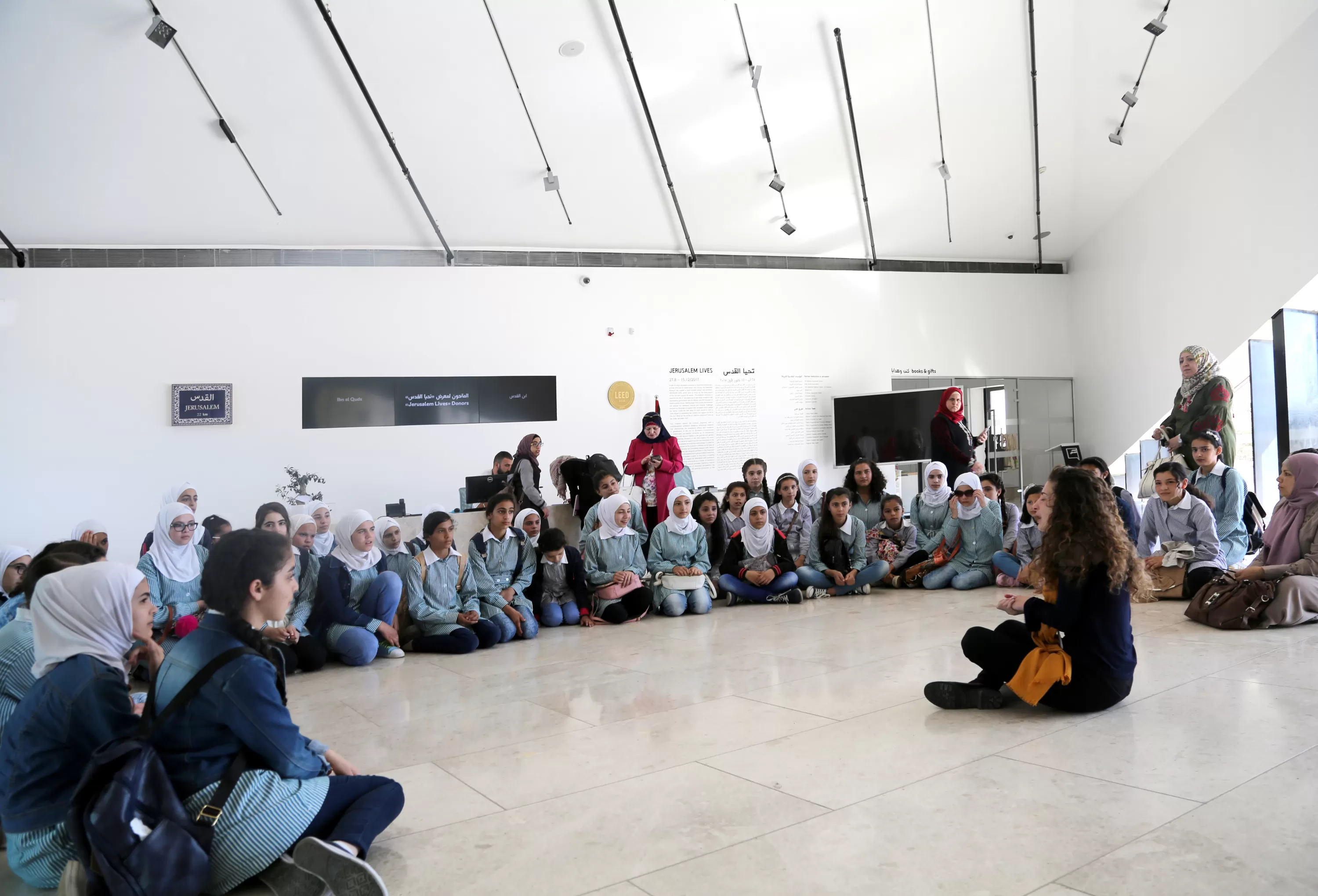
Birzeit: Since its launch last August, “Jerusalem Lives” exhibition has attracted over 12,000 visitors. During the past month, around 5000 school or university students, family members and interested visitors have attended or participated in the museum’s events. These events included two symposiums on the centenary of the Balfour Declaration and religious tourism in Jerusalem, an art workshop titled “The Knights of the Palestinian Museum” game, “Sow and Reap” activity in the museum’s garden, a life show by the TAPE THAT international art group, in addition to a number of guided tours for school or university students and the general public.
“The museum’s events are attracting more and more audience each month,” said Obour Hashash, the Public Programmes and Production Manager. “The museum is beginning to actually take on its role as a cultural destination for the Palestinian society and different tourist groups.”
In the centenary of the Balfour Declaration (1917-2017), lecturer and scholar Dr. Johnny Mansour presented his the results of his research and intellectual reviews on the Balfour Declaration, collected in his most recent book “The Centenary of the Balfour Declaration”. The discussion focused on the backgrounds and consequences of the declaration, the motives behind it, the factors that paved the way for realising it, and its impact on Palestine and the region.
A seminar on religious tourism in Jerusalem has also been organised, in which the head of Jerusalem Tourism Cluster, Ra’ed Sa’adeh, talked about the challenges facing the tourism sector in Jerusalem in general, and religious tourism in particular, discussing the efforts made to revitalize it. Since 2000, the number of hotels in Jerusalem has declined from 40 to 20 due to the occupations constraints, creating a real crisis in accommodating a large number of tourists in East Jerusalem. There are also many religious touristic sites in Jerusalem that are neglected and left out from Palestinian tourist programs. The museum is making these seminars available in full on its YouTube channel.
November events had begun with the TAPE THAT international art group, which created an artwork on one of the museum’s interior walls, using only tapes, in a live interactive show which allowed the audience to experience a creative unique art skill. The artwork’s concept was inspired by the museum’s architectural design. The museum hosted the group in collaboration with A. M. Qattan Foundation and the German Representative Office. The group had run a workshop with a number of young people interested in art, making their own artworks with tapes.
In addition, around 250 children participated in “The Knights of the Palestinian Museum” game, which was organised in collaboration with Bait Byout organisation. Children participated in various artistic experiences and adventures, from Play Dough formations, to singing, dancing, painting and storytelling, constantly drawing on Jerusalem for inspiration, and collaborating to bring it to life. This event will take place again on the 8th of December.
To further visitors’ interaction with the museum’s gardens, which tell Palestine’s botanic history, the museum organised “Sow and Reap” event, in which student from Tarqumia school alongside a youth group planted a number of winter seasonal crops, to be harvested in four months.
The museum is organising a diverse program this month, including two tours with Reem Faddah, the curator of Jerusalem Lives, a political tour in Jerusalem, a symposium titled “Planning Maps: Control and Liberation in a Colonial Context”, “The Knights of the Palestinian Museum” game, in addition to a ceramics art workshop to make Christmas tree decorations at the Church of the Holy Sepulchre and a workshop for interaction with Oscar Murillo’s artwork in Silwan Club, Jerusalem.
The Palestinian Museum is an independent institution dedicated to supporting an open and dynamic Palestinian culture nationally and internationally. The museum presents and engages with new perspectives on Palestinian history, society and culture. The museum is a flagship project of Taawon (Welfare Association), an independent Palestinian non-profit organisation, committed to providing development and humanitarian assistance in Palestine and the Palestinian communities in Lebanon.